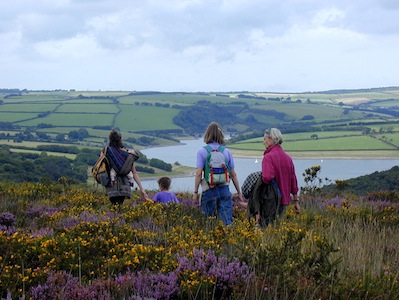
When it comes to landscapes the South West is hard to beat.
It’s the biggest English region in terms of area, home to the national parks of Dartmoor and Exmoor, and has more than a third of England’s areas of outstanding natural beauty.
And that’s before you even mention the beaches.
It’s also a healthy, happy and desirable place to live too.
The West Country has the highest average life expectancy for women in the country and the second highest average life expectancy for men.
One recent poll declared the people of the South West the happiest in the UK and another found that it’s the region we would most like to live in.
But despite the many attractions of the area, its local authorities experience many of the same social work recruitment challenges that exist nationwide.
“At one level the recruitment challenge in the South West is no different,” says Peter Lewis, interim director of children’s services at Somerset County Council.
“The number of social workers that we need collectively seem to exceed the number available so it’s always a highly competitive market.”
While this is a national problem, Lewis is puzzled that the South West often struggles to draw in social workers from other parts of the country.
“If you look at the pay levels in the South West, generally speaking they are competitive nationally – we pay social workers pretty well,” he says.
“You can move out of a very modest property in the South East into a very substantial property in the South West for pretty much the same money and have a complete change of lifestyle while doing the job that you’ve been trained for.”
The relative lack of cities in the South West might be a factor, suggests Paul Shallcross, a senior social work manager at Somerset.
While the South West does have a few sizeable cities, like Bristol, Bournemouth and Plymouth, it is one of the most rural regions with around a fifth of the population living in villages or small settlements.
Shallcross thinks that less urban existence might put some people off: “Young people are quite often attracted to living in large cities with a lot of stuff going on in terms of culture.
“I think the fact that we have a lot of nice but very small towns spread across a large geographical area is not necessarily the most attractive proposition for younger social workers but may attract experienced social workers.”
But beautiful landscapes and a change of lifestyle is not all that’s on offer to social workers in the South West as councils in the South West are also working to improve the career opportunities they offer.
“We’ve started to focus on new supervision frameworks, career pathways, the opening up of professional pathways and are looking at continuing professional development and how we support social workers with that,” says Sam Perry, lead HR business partner at Devon County Council.
“We are also looking at things like the technology people are provided with and have started to focus more on those aspects.”
Other South West councils say they are doing much the same.
On top of that many of the region’s authorities have teamed up to develop a shared approach to recruitment and retention of social workers.
The work began as a forum of West Country local authorities, brought together by social work agency Comensura, who were worried about the spiralling costs of hiring locum social workers.
Sarah Fealey, strategic HR manager at Wiltshire Council, says the forum has – with a few exceptions – slowed the rate at which locum pay is rising in the South West and now the eight councils involved are looking at how they can team up to recruit and retain permanent social workers.
“We’re recognising there is value in working together rather than just directly competing all the time for what is a small resource of people and making the best use of the resources we all have available to get the best people for our area,” she says.
And that should benefit social workers too, adds Shallcross.
“Social workers want to work in stable teams with colleagues who they know are permanent and who are all roughly being paid the same amount. If we can stablise recruitment in the area it will benefit everybody across the region.”


 Bournemouth, Christchurch and Poole
Bournemouth, Christchurch and Poole  Hampshire County Council
Hampshire County Council  Lincolnshire County Council
Lincolnshire County Council  Norfolk County Council
Norfolk County Council  Northamptonshire Children’s Trust
Northamptonshire Children’s Trust  South Gloucestershire Council
South Gloucestershire Council  Wiltshire Council
Wiltshire Council  Wokingham Borough Council
Wokingham Borough Council  Children and young people with SEND are ‘valued and prioritised’ in Wiltshire, find inspectors
Children and young people with SEND are ‘valued and prioritised’ in Wiltshire, find inspectors  How specialist refugee teams benefit young people and social workers
How specialist refugee teams benefit young people and social workers  Podcast: returning to social work after becoming a first-time parent
Podcast: returning to social work after becoming a first-time parent  Podcast: would you work for an inadequate-rated service?
Podcast: would you work for an inadequate-rated service?  Family help: one local authority’s experience of the model
Family help: one local authority’s experience of the model  Workforce Insights – showcasing a selection of the sector’s top recruiters
Workforce Insights – showcasing a selection of the sector’s top recruiters 

 Facebook
Facebook X
X LinkedIn
LinkedIn Instagram
Instagram
Comments are closed.